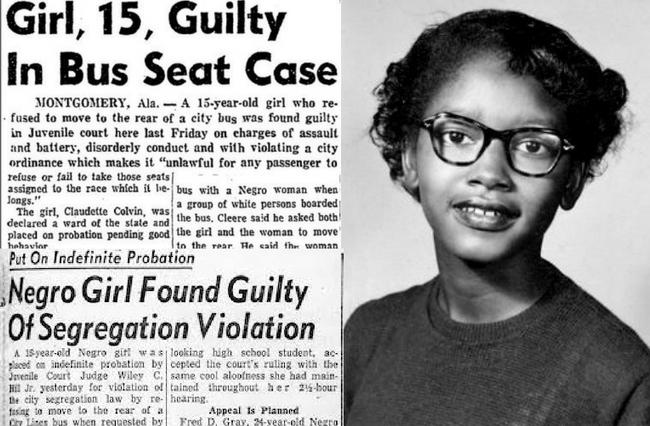Impact Blacks: Claudette Colvin
This is the second part in our series, celebrating Black History Month.
Everyone knows the story of Rosa Parks and how she refused to give her up her seat on the bus, and most of us know about the controversy that enveloped the entire affair; that it was not the first time a black woman refused to move, yet we continue to attribute the de-segregation of busses to Rosa. Now, there is dispute that what Mrs. Parks did was courageous and daring, after all, she had the disadvantage of being black and a woman, a losing combination back in the fifties. In fact, there is very little dispute over whether or not the controversy surrounding this incident should exist. The problem lies in why Rosa was chosen to be a martyr of some sorts over Claudette.
Claudette Colvin was only fifteen years-old, a darker skinned school girl from Alabama. She attended school in the city, and since her parents did not own a car, she relied on public busses to get back and forth anywhere she went. She was member of the NAACP Youth Council, and described by words such as mouthy, emotional, and feisty. On her way home from school, she and three other women were asked to give up their seats so a white woman could sit down, one of these women being pregnant. Two women moved immediately, while the pregnant woman and Claudette refused. Eventually, a man gave up his seat so that they may sit down, but Claudette vehemently refused. She was then arrested and forcibly removed from the bus, charged with disturbing the peace, refusing to obey the segregation laws, and assault, though there was no assault.
Members of the black community will scream and shout that we do not recognize Claudette the same way or learn about her in the same respect that we do Mrs. Parks is
because she was pregnant by a married man at the time, and we didn’t want a high school student who was pregnant out of wedlock to be the feminine face of the Civil Rights Movement. This answer would be completely acceptable, only if it wasn’t blatantly false. Claudette would become pregnant by a married man, this wasn’t until the incident had past. I believe that Claudette was a victim of classism and colorism, and was not acknowledged by the black community because she was a poor, dark-skinned, loud teenager, while Rosa had a higher social status, lighter skin, and was incredibly mild mannered. Rosa Parks was recognized because she represented nearly everything the perfect woman was, quiet, hard-working, courageous, but classy. Rosa had these traits in a light-skin black body, and the white people would notice this and be more willing to listen and defend her rather than defend Claudette, a darker, younger, more rebellious girl.
Claudette was silenced because the color of her skin was darker than her fellow black women, a problem we still face today. Black people today need that there is a divide between the colors of our skin, and learn not to silence each other.











